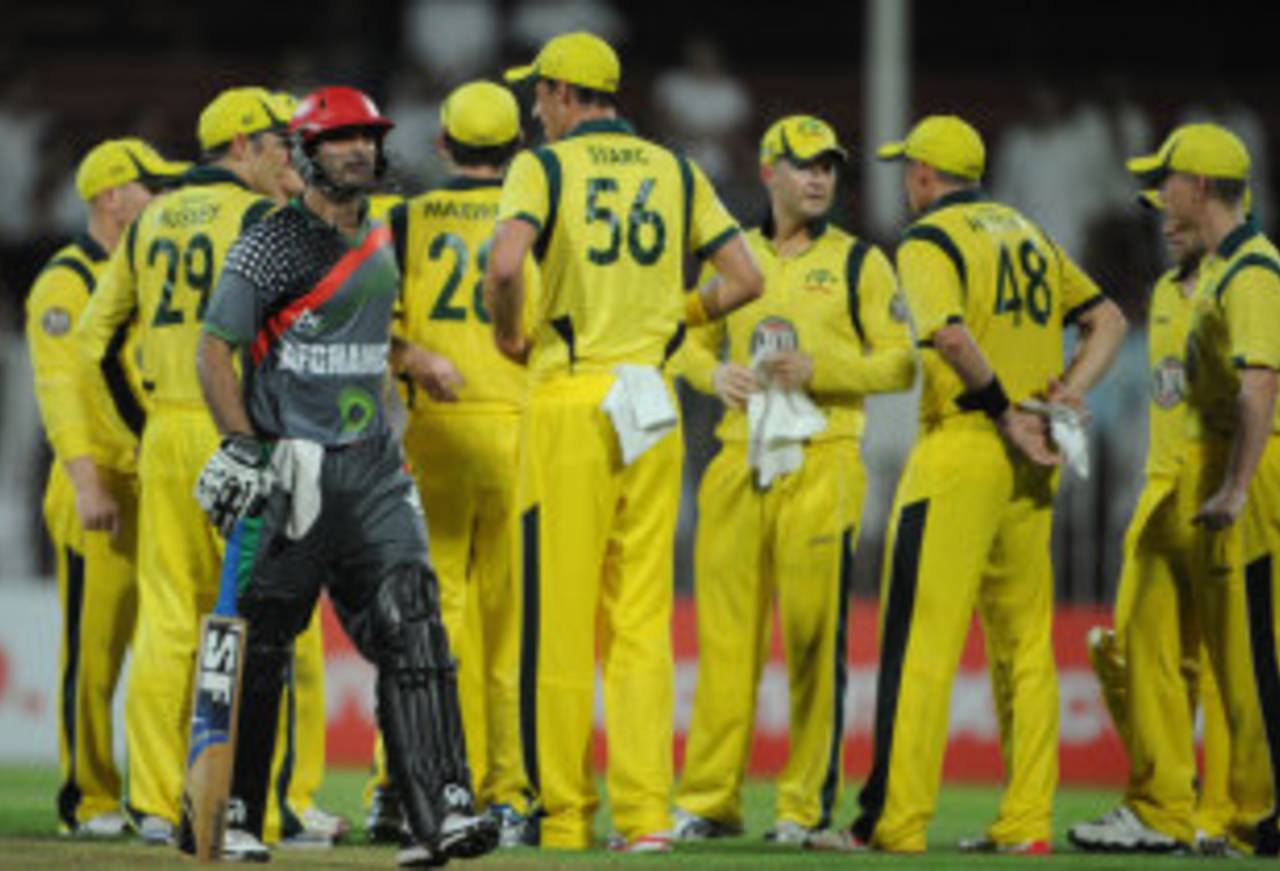Slippery ball puzzle for Australians
Frustrated as much by a slippery ball as a doughty Afghanistan during their 66-run victory, Australia's bowlers must find ways of keeping dry in the damp night-time air before they face Pakistan
Daniel Brettig
Aug 26, 2012, 12:50 AM

Hand towels all round in the damp Sharjah air • AFP
Frustrated as much by a slippery ball as a doughty Afghanistan during their 66-run victory, Australia's bowlers must find ways of keeping dry in the damp night-time air before they face a far more accomplished Pakistan team.
While the Australians began brightly in defence of 272 for 8, reducing Afghanistan to 49 for 4 inside 12 overs, the longer the innings went the more they battled to keep their hands and the ball dry. Their difficulties were reminiscent of those experienced by Mark Taylor's men in the 1996 World Cup final, won by Sri Lanka on a dewy night in Lahore.
Mitchell Starc, who won the match award for figures of 4-47 that included four of the first six Afghanistan wickets, said that while happy with the overall effort, the tourists would be looking into how to maintain better control with the ball later in the innings, with two more matches to be played in Sharjah against Pakistan.
"I don't think we thought too much about the humidity, we thought it was going to be more a dry heat," Starc said. "As we've seen the last few days and again tonight, it's more the sweat factor that's going to play a part and the dew as well. Both balls towards the end were quite hard to hold onto - you'd wipe yourself with a towel and you were already sweating again.
"So it's something we're going to have to look at in training before the Pakistan series, but in the end I think the bowlers did quite well to control that ball. There's a few little things we're going to have to work on, but the batsmen put on a good score for us to defend, and we defended it."
Apart from the humidity, the Australians were also somewhat surprised to find a Sharjah pitch that did not turn with quite the same venom of those prepared for their preparations in Darwin. Though the surface lacked grass and did not offer any great pace, nine of the Afghanistan wickets fell to the fast men.
"I think the wicket played a lot better than we thought it would," Starc said. "We prepared for wickets that were going to spin a lot. The quicks took nine of our wickets so I think the fast bowlers are going to play a massive part as well as the spinners in these conditions.
"Afghanistan put up quite a good fight for us ahead of the Pakistan games, and the conditions a lot of us haven't played in before, so it was a bit of a learning curve for some of us. I thought it was a good game in preparation for the next series."
Starc said the Australians had been impressed by the intensity of Afghanistan's fielding in the heatof the early evening. "A lot of us made comments during our batting innings that they fielded quite well," he said. "They were out there with a lot of energy, and that surprised us a little bit that they fielded as well as they did, and then with the bat they came out quite aggressively as well … it was quite a competitive match."
Afghanistan's captain Nowroz Mangal said the game had provided decent evidence of his team's ability to compete with the major nations. "The players played very well. Australia is one of the best teams in the world," he said. "The way the bowlers performed and the way we fielded, it was quite satisfactory and we proved we can compete with such big sides. We have learned a lot.
"This was a better performance than we put up against Pakistan. I'd like to thank Cricket Australia for allowing us to play their team. We played the T20 World Cup in the West Indies and we'll rectify the errors we made then."
Daniel Brettig is an assistant editor at ESPNcricinfo. He tweets here